Fisherman Issue with Sri Lanka | 21 Dec 2021
For Prelims: Location of Katchatheevu Island and Palk Bay Strait
For Mains: Impact of Fishermen issue on India Sri Lanka Relations and what India is doing in this direction
Why in News
Recently, as many as 43 fishermen from Tamil Nadu were arrested and six boats seized by Sri Lankan Naval personnel.
- A total of 284 Indian fishermen were arrested by Sri Lanka in 2019 (210) and 2020 (74).
- Earlier in 2020, the Fourth Meeting of the India-Sri Lanka Joint Working Group (JWG) on Fisheries was held through virtual mode.
Key Points
- Background:
- Both Indian and Sri Lankan fishermen have been fishing into the Palk Bay area for centuries.
- Palk Bay is a semi-enclosed shallow water body between the southeast coast of India and Sri Lanka.
- Problem emerged only after a maritime agreement was signed by India and Sri Lanka in 1974.
- In fact, initially the 1974 border agreement did not affect fishing on either side of the border.
- In 1976, through an exchange of letters, both India and Sri Lanka agreed to stop fishing in each other’s waters.
- In 1974 and 1976 treaties were signed between the two countries to demarcate the International Maritime Boundary Line (IMBL).
- The treaties also ended up making the Palk Strait connecting India and Sri Lanka a ‘two-nation pond’, under the relevant United Nations Convention on the Law of the Sea (UNCLOS) rules to the exclusion of all third nations.
- Simply put, the bilateral arrangement bans international fishing and shipping.
- However, the agreement could not stop the fishermen from fishing in these waters, as fishermen know no boundary.
- Despite the signing of maritime boundary agreements, fishermen communities of both the countries continued their fishing in the Palk Bay area peacefully until the Eelam war broke out in 1983.
- Nonetheless, after the end of War in 2009, the Sri Lankan fishermen have been raising their objection to Indian fishermen fishing in their waters.
- Later, India and Sri Lanka agreed to set up a Joint Working Group (JWG) on Fisheries in 2016 between India and Sri Lanka as the mechanism to help find a permanent solution to the fishermen issue.
- Both Indian and Sri Lankan fishermen have been fishing into the Palk Bay area for centuries.
- Katchatheevu Island Issue:
- The small islet of Katchatheevu, hitherto used by the fishermen for sorting their catch and drying their nets, fell on the other side of the IMBL
- Fishermen often risk their lives and cross the IMBL rather than return empty-handed, but the Sri Lankan Navy is on alert, and have either arrested or destroyed fishing nets and vessels of those who have crossed the line.
- Reasons for the continuation:
- The main problem with Indian fishermen is that a large number of them are dependent on fishing in Sri Lankan waters, which is prohibited by the 1976 Maritime Boundary Agreement.
- Also, a large number of Indian fishermen are dependent on trawling which is banned in Sri Lanka.
- Related Initiatives Taken:
- The IMBL is imaginary, but it was geo-tagged and is visible to the fishermen, due to Global Positioning System (GPS) sets.
- Deep Sea Fishing Scheme:
- Promoted as an alternative to bottom trawling by Tamil Nadu’s fishermen off the Palk Bay, the scheme envisages the provision of 2,000 deep sea fishing boats in place of trawlers by 2019-20, which will be the third and final year of implementation of the scheme.
- It aims to put an end to disputes arising between the two countries.
- It has been taken up under the ‘Blue Revolution’ scheme.
- Promoted as an alternative to bottom trawling by Tamil Nadu’s fishermen off the Palk Bay, the scheme envisages the provision of 2,000 deep sea fishing boats in place of trawlers by 2019-20, which will be the third and final year of implementation of the scheme.
Way Forward
- The fishing equipment that is prohibited in Sri Lanka must be banned by India in the Palk Bay.
- Fishing practises that do irreparable damage to marine ecology must be given up.
- The damage to the Indian fishermen could be ameliorated if the announcement is followed by two steps.
- The trawlers can be used in the Odisha coast where waters are very deep
- Trawlers could, with certain modifications, be used as smaller fishing vessels that cater to the mothership.
- India can transform the Palk Bay from a contested territory to a common heritage.
- The first step is to recognise that there are various stakeholders—two Union and provincial governments, the Navies and Coast Guards, fisheries departments and above all, fishing communities of the two countries.
- The next step should be to form a Palk Bay Authority (PBA) consisting of marine ecologists, fisheries experts, strategic specialists and government representatives.
- The PBA could determine the ideal sustainable catch, type of fishing equipment that can be used, and the number of fishing dates for Sri Lankan and Indian fishermen.
- The focus should be on enrichment of marine resources and improvement of the livelihoods of fishermen.


